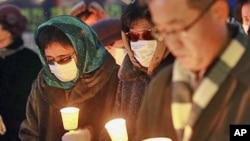A United Nations report is criticizing the lack of freedom of expression and association and other fundamental rights in North Korea. A report submitted to the U.N. Human Rights Council in Geneva finds violations have increased because of, what it calls, unprecedented tension in the region.
In his report, the special investigator on the human-rights situation in the Democratic People’s Republic of Korea focuses on the plight of separated families and the ongoing tragedy of nationals abducted in Japan and South Korea.
Investigator Marzuki Darusman urges North Korean officials to resume the stalled family reunions between the North and the South out of compassion for the families who have been separated for decades.
He highlighted the question of abduction, affecting nationals of South Korea, Japan and several other countries. He noted more than 3,800 people reportedly have been abducted since the ceasefire of the Korean War. He said the cases of 500 people missing from South Korea and 12 from Japan are still pending.
Darusman said human-rights violations are widespread in North Korean correctional facilities and the conditions of detention are appalling.
“Correctional officers would sometimes beat inmates, but it is understood that more often it is the inmates who would beat up other inmates upon instruction from the officers. It is further claimed that human-rights abuses, including deaths, are rampant inside correctional centers. These are serious allegations that need to be investigated and rectified immediately. Apart from the official correctional centers, North Korea is reported to have been operating a number of political concentration camps, collection centers, and labor-training camps,” said Darusman.
North Korea rejected requests from the U.N. special investigator to visit the country. So instead, he had to gather his information from government officials, private organizations and victims of North Korean human-rights abuse who have fled to South Korea and Japan.
Investigator Darusman said the adverse human-rights situation in North Korea is causing an increasing number of people to seek refuge outside of the country, at great risk to themselves and their families.
He said that since the late 1990s, the numbers of asylum seekers in South Korea has risen from fewer than 1,000 to 20,000 in 2009.
The North Korean Ambassador, So Se Pyong, categorically rejects the report, calling the appointment of the Special Investigator to monitor human rights in his country a conspiracy hatched by the United States, Japan and the European Union.
“This... are a product of political confrontation and plot aimed at eliminating the state and social system of the DPRK [North Korea] on the pretext of human rights and has no relevance to genuine human rights.”
The ambassador dismissed the special investigator’s report as being full of fabrications and slander.
Human Rights Situation in North Korea Is Deplorable
- By Lisa Schlein










